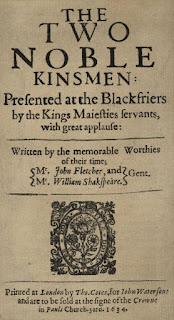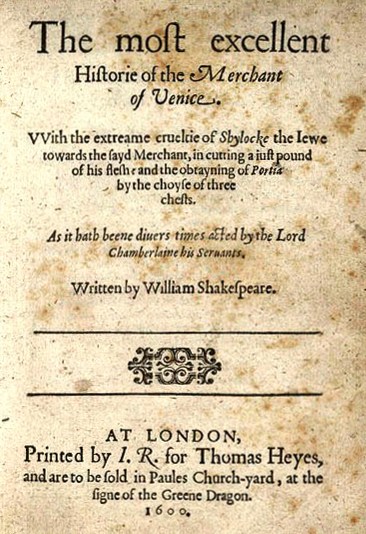Henry VI Part 1 - “ … Unbidden guests are often welcomest when they are gone.”
Henry VI Part 1 - "Unbidden guests are often welcomest when they are gone."
1591 were turbulent times in London. Catholic uprising and executions of Catholics rose again during this year. Ireland flares up again and the Irish lord Brian O'Rouke is brought to London and executed for treason. On top of this, English ships are captured and lost in the ongoing Anglo-Spanish Wars.In this atmosphere, Shakespeare took time away from acting to complete his Henry VI trilogy by writing the prequel 'Henry VI Part I'.
This play could be subtitled, ‘The Times They are a Changing’. The warrior culture of Henry V has moved along with his death and Henry VI has inherited disunity, petty squabbles and an ongoing war with France. Even chivalry is dead and the character of Talbot represents its last fortress. Shakespeare also knows that he needs more than chivalric decay to sustain this opening to his greatest historical adventure. He pillages the enigmatic character of Joan of Arc, a woman who succeeds wonderfully in the male domain of the battlefield (a timely tribute to Elizabeth I’s beating back of the Spanish Armada three years prior in 1588).
The opening of this ‘History’ play deals only very loosely with history since Shakespeare moves quickly and freely between events that happen years apart (and events that didn’t happen as he portrays) to create a fast-paced speedily shifting montage of scenes from the battle at Orleans to the political and petty intrigues of England following Henry V’s death. This is an action-packed opening and Shakespeare, for perhaps the first time, learns the power of actions and directions on the page and the way they can control pace on the stage. The battle between Talbot’s forces and those led by Joan of Arc are described by stage direction, even though Talbot’s final defeat (in good Ancient Greek dramatic fashion) happens off-stage. The act ends with even the French being shown as prone to petty squabbles as most of the French nobles want to ignore Joan and only honour the male nobles who were involved in the battle. Luckily, Charles steps in and sees the victory as primarily Joan’s. Hell hath no wrath like a woman with something to prove with a weapon in her hand.
Act 2
“ … Unbidden guests
Are often welcomest when they are gone.”
The pace picks up in Act 2 with difficult-to-stage castle attacks. The French are ambushed by Talbot and his men. The French, half-dressed and half-drunk fight them back. Some start to blame Joan of Arc and think she is a spy for the English while the English, influenced obviously by the precursor to the Fleet Street press, think she is a devil. Charles stands up for her again, much to the distain of some of his men. The French have no course but to sound their retreat.
Meanwhile, back at the battlefield, Talbot is invited by a French Countess to her castle because supposedly she is in awe of his exploits. He goes, but it is a trap to capture him? Is this the end for our Medieval Man of Mystery? Will the chivalrous Talbot be brought down by the charms and deceit of a woman? Of course, Talbot, having no Batcave with nifty devices, anticipated all outcomes. He laughs at The Countess when she says he is her prisoner and says (in a riddle that would riddle even the Riddler) that he is omnipresent and that part of him will always be elsewhere. His soldiers enter the castle and like a gallant gentleman, Talbot accepts The Countess’ apologies and sits down to feast. But as is often the case in Shakespeare's world, it is when someone’s light shines brightest that a faint shadow emerges in the background. For Talbot is a relic of an honorable and brave past, which Shakespeare will show us, cannot survive.
Act 3 – “…thoughts were sifted… from the envious malice of thy swelling heart…”
Conflict and contrast dominates this act. Shakespeare is learning his craft and his verse skills are building. In England, no-one seems like a happy bunny in the court of Henry VI and he just wants to sit in a corner since he can’t cope with all the political infighting in England. Should he reinstate heredity rights to the thrown? Does heredity bring certainty or does certainty come through freedom of spirit, working hard, fighting hard (and presumably drinking hard) like Talbot does in the field of battle over in France? Then there is Joan of Arc, who seems to win and have fate, or higher powers, on her side. Fate versus Free Will. This act deals with the big questions for people of Shakespeare's times considering what happened with Henry VIII and the final stability brought by Elizabeth I – a single woman and daughter of a early Henry VIII wife who lost her head.
We also see the contrast of modes of war. Joan, like the Afghans and the Vietnamese after her, refuses to play by the old rules of engagement and warfare and what is worse for Talbot, she seems to be succeeding at it better than the WASP males. The new heroes of war are imaginative, flexible and… female. And besides, the English nobles are still fighting themselves. The French embrace Joan’s imaginative leadership for the moment, meanwhile, envious malice slowly swells their hearts.
Acts IV & V – “I owe him little duty and less love.”
Henry gets the pretension of being crowned in Paris but this is undermined by the petty squabbles of his nobles. In fact, it is Somerset's animosity to York that makes Somerset so slow in providing troops and this leads later to the death of the chivalrous Talbot and his son. Shakespeare makes us admire Talbot to the last but he elicits some sympathy for York who tries desperately in the end to save Talbot. This sympathy for York works dramatically plus sets up our sense of some allegiance for his cause in the later Henry plays.
The French seem to have the upper hand in the war again. Talbot dies and the baton of England’s fate is passed into the hands of the unfit courtly politicians. Joan of Arc’s unorthodox methods and guerrilla tactics seem to have won the day. The world has changed and Joan’s attitude to the noble dead as simply bodies that stink and attract flies along with the politics of those who do not understand peace being the ones who broker peace, is decidedly contemporary. France looses its advantage and the politicians jockey for position. With Talbot’s death still wafting in the air, Joan of Arc’s death becomes inevitable. She calls upon the spirits who championed her, to help her, but bitumen and the fire await her offstage.
We do not end the play with a triumphant and powerful Henry VI. A peace is brokered but many English nobles are flabbergasted at how many territories Henry VI has given back to the French. Infighting and petty squabbles still lie within the English camp. Suffolk, who has negotiated the marriage of Henry VI to Margaret daughter of the King of Naples (and Jerusalem), seems to be manipulating Henry while openly declaring his own love for Margaret. The play ends in peace but with love and duty dead with Talbot, something is decidedly rotten in the state of Henry VI’s England.
Shakespeare returns next in in the bloody Titus Andronicus.




Comments
Post a Comment